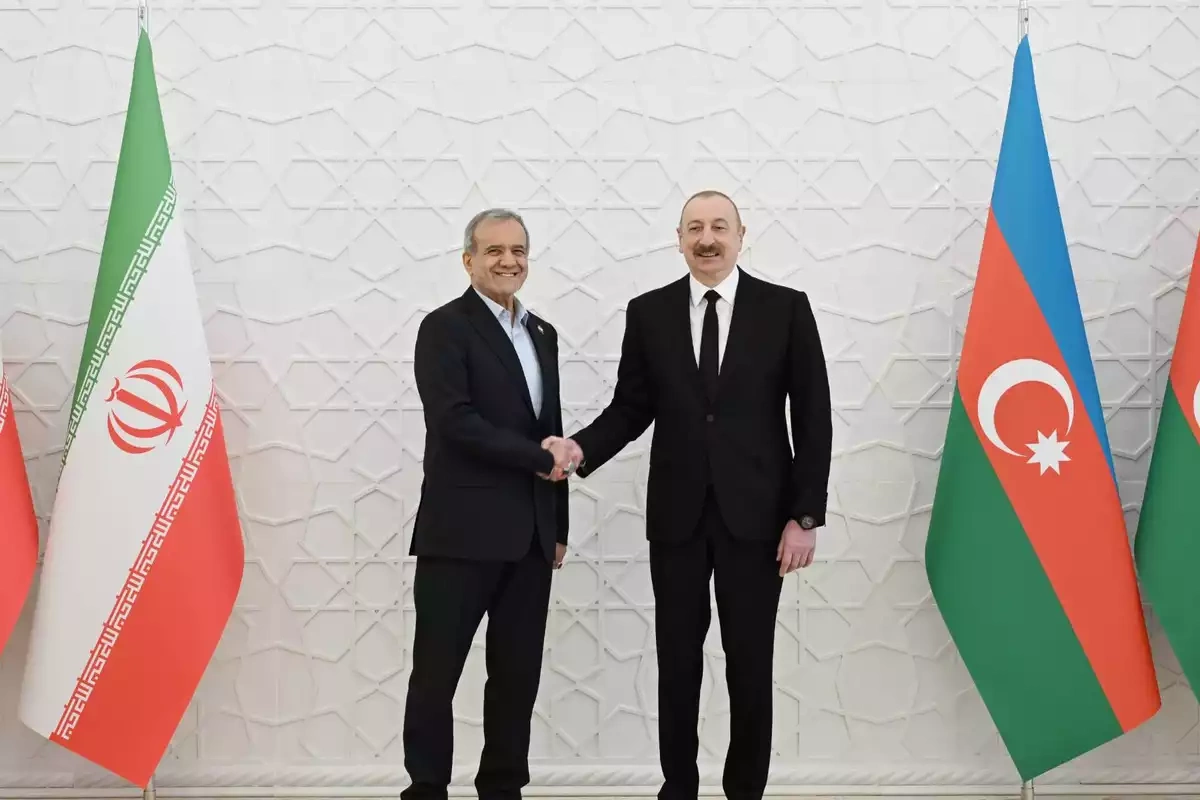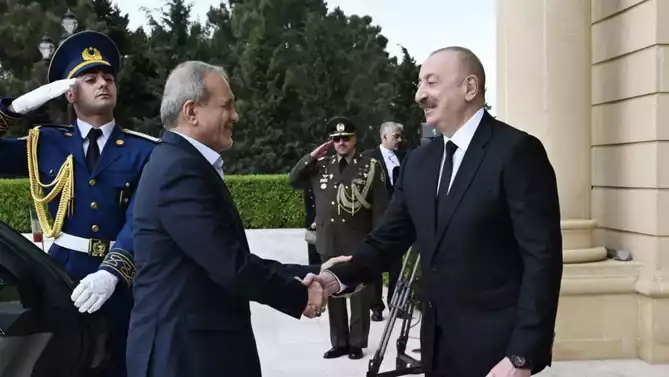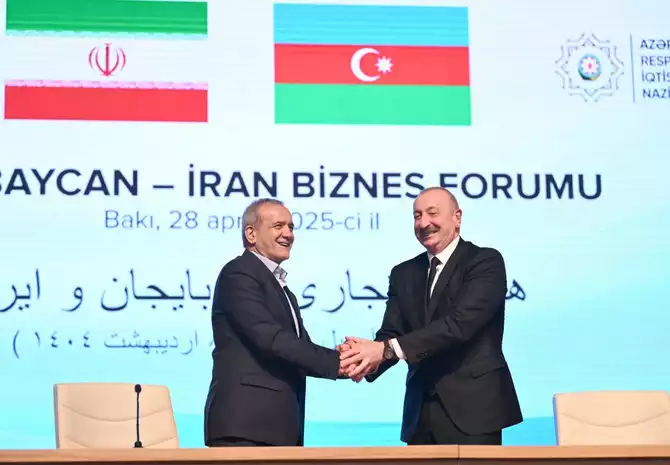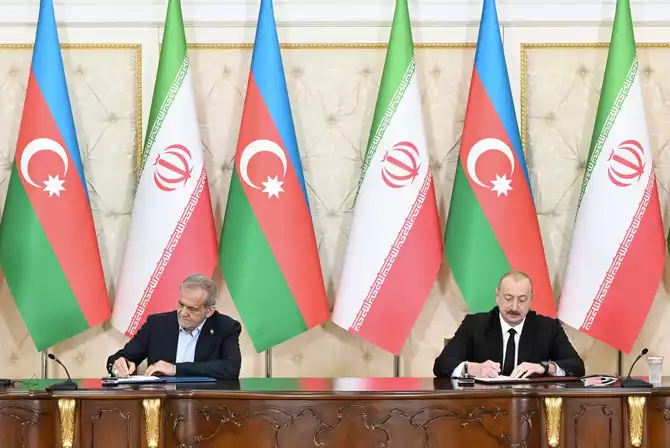
By Tural Heybatov
Iranian President Masoud Pezeshkian paid an official visit to Azerbaijan. Although the visit lasted only one day, it was packed with significant events.
Photo credit: Official website of the President of the Republic of Azerbaijan
According to Mehdi Sanaei, Deputy Head of the Political Department of the Iranian Presidential Administration, President Pezeshkian had to shorten his stay in Baku to personally oversee the situation in Bandar Abbas, where a powerful explosion on April 26 claimed 46 lives and injured more than 1,200 people.
Nevertheless, during the brief visit, both sides managed to discuss all key issues, hold a business forum, and sign a number of important agreements. The atmosphere of the visit was warm and constructive. According to President Pezeshkian, he intends to continue the program he started during this visit: "In the near future, I will once again be the guest of my brother. Here, I do not feel like a stranger. In Azerbaijan, I feel as if I am in Tabriz or Ardabil. We share much in common, and we are proud of it," he said.

Photo credit: Official website of the President of the Republic of Azerbaijan
Observers noted that Pezeshkian openly embraced his Azerbaijani heritage, without attempting to present himself as "more Persian than the Persians," which resonated positively with journalists, the public, and, evidently, with President Ilham Aliyev. President Aliyev expressed confidence that Pezeshkian's visit would play a crucial role in strengthening bilateral relations.
Today, cooperation between Azerbaijan and Iran spans a wide range of areas. One of the central topics of discussion was the development of the International North-South Transport Corridor. President Aliyev emphasized that the project would bring substantial benefits to all participating countries. Azerbaijan has already completed the necessary infrastructure on its territory and continues to expand its capabilities, particularly at the northern section of the railway near the Russian border. Additionally, Azerbaijan is constructing a cargo terminal on Iranian territory, which will be owned and operated by Azerbaijan Railways. The terminal is expected to be completed by the end of this year.
Special attention is also being given to the development of the road segment within the North-South Corridor. At the business forum in Baku, President Pezeshkian stressed that Azerbaijan and Iran now form a true crossroads for the key transportation routes of East-West and North-South, becoming important hubs for trade, knowledge exchange, and technology transfer.
An important addition to this infrastructure network will be the Araz Corridor. During the business forum, President Aliyev reiterated that despite various unfounded rumors circulating around the world, the Araz Corridor is simply another transport route - a communications link that will connect Azerbaijan’s eastern regions with the Nakhchivan Autonomous Republic via Iran, and could serve a significant transit role.
Azerbaijan is nearing completion of the Goradiz-Agbend railway, which will reach the Iranian border and be connected to Iran’s railway network via a bridge over the Araz River. The road segment of the Araz Corridor is also expected to be completed by the end of this year. Although there had been concerns that the project might face delays similar to those encountered with the Rasht-Astara railway line, President Pezeshkian’s statements in Baku reaffirmed Tehran’s strong commitment to completing the project by the end of 2025.
The Agbend-Kelaleh bridge will become a key element of the region’s strategic transportation infrastructure. Once completed, the new route will provide the shortest and most efficient transport connection between Azerbaijan’s East Zangazur Economic Region and the Nakhchivan Autonomous Republic, while also becoming an important link in the international East-West transport corridor.
Beyond economic issues, Pezeshkian’s visit also addressed humanitarian and cultural cooperation. In a statement to the press, President Aliyev announced that both sides had given concrete instructions to strengthen traditional friendly ties in these areas. It was agreed that cultural days would soon be held in both countries - an initiative that had not taken place for eight years. "Our peoples share a common history and culture. For centuries, we lived together under one state, and many familial ties unite us. Today, as two independent nations, we play an important role in our region. Both sides believe and advocate that regional matters should be resolved by the countries of the region themselves," Aliyev emphasized.

Photo credit: Official website of the President of the Republic of Azerbaijan
The breadth of the discussions was reflected in the documents signed during the visit:
• A Program of Political Consultations between the Ministries of Foreign Affairs for 2025-2027;
• A Memorandum of Understanding on Comprehensive Cooperation in the Field of Transport for 2025-2026;
• A Memorandum of Understanding on the Training and Certification of Seafarers and the Mutual Recognition of Watchkeeping Certificates;
• A Cultural Exchange Program for 2025-2028;
• A Memorandum of Understanding on Cooperation in the Media Sphere.
Of particular importance was President Pezeshkian’s clear articulation of Iran’s position regarding Azerbaijan’s territorial integrity: "We firmly believe that the rights of the Azerbaijani people must be respected, and that Karabakh should belong to Azerbaijan. Karabakh is an integral part of Azerbaijan’s territory, and we fully respect that," he stated.
Despite the forced shortening of the visit due to the tragedy in Iran, Pezeshkian’s trip clearly demonstrated that Azerbaijan-Iran relations have emerged from the crisis. According to President Pezeshkian, the countries of the region are capable of establishing relations "even stronger than those among European states."
Both Azerbaijan and Iran have all the necessary foundations to achieve this ambitious goal.
Share on social media